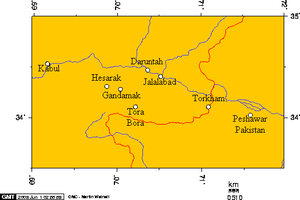Torkham border crossing: Difference between revisions
m →Railway |
→Railway: fix link; change wording |
||
| Line 218: | Line 218: | ||
In 1891 the [[British Raj|British]] extended the [[Indian Railways]] (now [[Pakistan Railways]]) to Torkham. The rails were not extended into Afghanistan to the north and west for political reasons. |
In 1891 the [[British Raj|British]] extended the [[Indian Railways]] (now [[Pakistan Railways]]) to Torkham. The rails were not extended into Afghanistan to the north and west for political reasons. |
||
Over much of the last century, there have been proposals to extend the Torkham line to Afghanistan and possibly beyond, passing through Jalalabad. These proposals have the support of the current Afghan government. In July 2010, Pakistan and Afghanistan signed a [[Memorandum of understanding]] for going ahead with the laying of [[rail tracks]] between the two countries. Work on the proposed project |
Over much of the last century, there have been proposals to extend the Torkham line to Afghanistan and possibly beyond, passing through Jalalabad. These proposals have the support of the current Afghan government. In July 2010, Pakistan and Afghanistan signed a [[Memorandum of understanding]] for going ahead with the laying of [[rail tracks]] between the two countries. Work on the proposed project was supposed to start in 2010.<ref>[http://www.pajhwok.com/en/2010/07/07/pakistan-afghanistan-ink-mou-rail-links Pakistan, Afghanistan ink MoU on rail links]</ref> |
||
==Gallery== |
==Gallery== |
||
Revision as of 02:55, 30 November 2011
Torkham | |
|---|---|
 Torkham's passing point on the Afghanistan side | |
 Kabul, Peshawar, and some cities in Nangarhar | |
| Country | |
| Province | Nangarhar Province |
| Elevation | 3,497 ft (1,066 m) |
| Time zone | UTC+4:30 |
Torkham ([طورخم Tūrkham] Error: {{Lang-xx}}: text has italic markup (help)) is a border crossing town in the Nangarhar province of Afghanistan and the Khyber Agency of Pakistan's Federally Administered Tribal Areas, right on the Durand Line border.[1][2][3] It is linked by a highway with Jalalabad to the west and Peshawar to the east, connecting with N-5 National Highway all the way to Karachi. The town is only five kilometres west of the summit of the Khyber Pass. Torkham is the busiest port of entry between Afghanistan and Pakistan, serving as a major transporting, shipping, and receiving site between the two neighboring countries.[4]
Torkham and the vast surrounding area is inhabited by ethnic Pashtun tribes or Pashtun people. In November 2001 the New York Times reported that Torkham was the home of Hazrat Ali, an anti-Taliban militia leader who seized power after the Taliban retreated.[2] The New York Times reported that Hazrati Ali had joined forces with two other militia leaders, Mawlawi Yunis Khalis, and Ezatullah, to set up a regional provisional government.
In April 2006 the Afghan Border Police began requiring travelers crossing the border at Torkham to possess valid travel documents.[3][5]
Highway 7 connects Torkham to Kabul.[6]
American forces staff the nearby Towr Kham Fire Base.[7][8]
Torkham lies on the most important supply route for ISAF forces in Afghanistan. Pakistan has used blocking supplies as a bargaining chip, for example as a reaction to coalition forces attacking targets in Pakistan for example in 2008[9] and 2010.[10]
Railway
In 1891 the British extended the Indian Railways (now Pakistan Railways) to Torkham. The rails were not extended into Afghanistan to the north and west for political reasons.
Over much of the last century, there have been proposals to extend the Torkham line to Afghanistan and possibly beyond, passing through Jalalabad. These proposals have the support of the current Afghan government. In July 2010, Pakistan and Afghanistan signed a Memorandum of understanding for going ahead with the laying of rail tracks between the two countries. Work on the proposed project was supposed to start in 2010.[11]
Gallery
-
Pakistani side of the border crossing
-
Customs weighing scale
-
US soldier on the Afghan side
-
Citizens from both nations crossing the border
See also
References
- ^ "Rebuilding Afghanistan: Strengthening the Government" (PDF). USAID. March 24, 2004. Retrieved 2008-01-22.
- ^ a b David Rohde (November 16, 2001). "A NATION CHALLENGED: AFGHANISTAN REDUX; Warlord Rule Is Re-emerging In Some Towns". New York Times. Retrieved 2008-02-19.
- ^ a b "ANP secure Torkham border" (PDF). Defense and Security, Afghanistan. April 4, 2006. Retrieved 2008-02-19.
- ^ Nancy Hatch Dupree. "An Historical Guide To Afghanistan - From The East - Chapter 10 - Torkham to Kabul".
- ^ "Afghan Police Secure Towr Kham Border". American Forces Press Service. April 10, 2006. Retrieved 2008-02-18.
- ^
Lt. Col Gordon Phillips and State Department Representative Shawn Waddoups (August 22, 2007). "DoD News Briefing with Lt. Col. Phillips from Afghanistan". United States Department of Defense. Retrieved 2008-02-10.
As far as the second question about roads to connect to the Ring Road, we have recently received approval to build -- or to make asphalt roads that connect four of the important district centers here in Nangarhar to Highway 1, which is the main road that runs from Torkham gate, the border crossing point with -- between Afghanistan and Pakistan and runs into Kabul and connects with the Ring Road.
- ^ Sgt. Matt Summers (May 26, 2006). "'Fighting Deuce' MPs Patrol Afghan Mountains". Defend America. Retrieved 2008-02-18.
- ^ "Afghan Border Police, Villagers Secure Border". Defend America. May 24, 2006. Retrieved 2008-02-18.
- ^ Pakistan blocks fuel to US forces, SEPTEMBER 06, 2008
- ^ "Pakistan 'to reopen key NATO Afghanistan supply route'". BBC News. 2010-10-09. Retrieved 2010-10-09.
- ^ Pakistan, Afghanistan ink MoU on rail links




